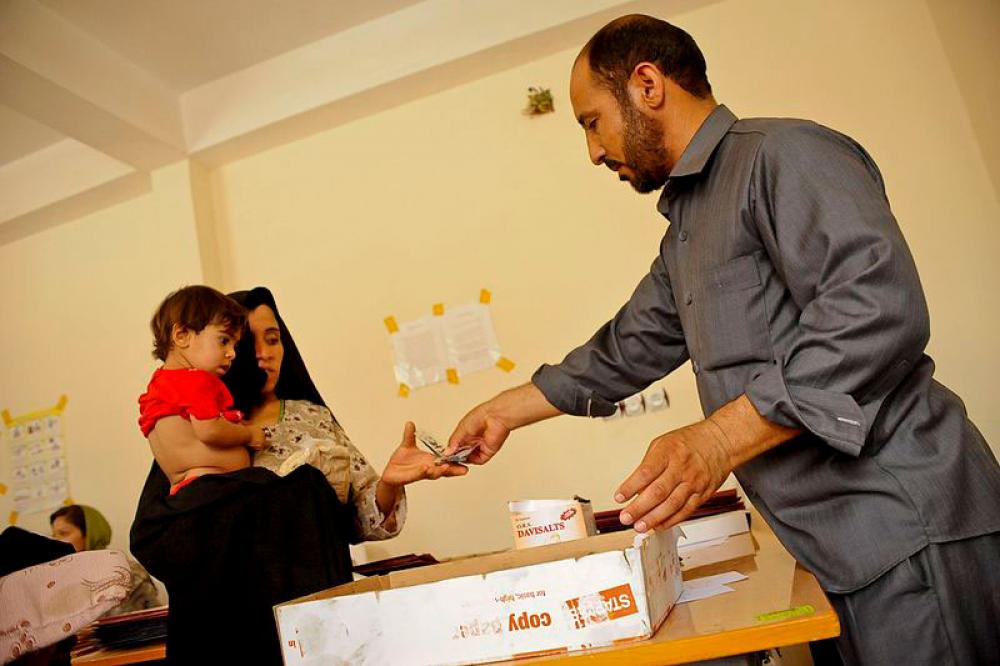Just Earth News | @justearthnews | 01 Feb 2022

File image by US Air Force via Wikimedia Creative Commons
Kabul: Pneumonia cases are soaring in Afghanistan, killing children who are unable to access healthcare facilities, Save the Children said today.
An assessment by the children’s agency found that in December more than half (55 percent) of surveyed households who needed healthcare in the prior three months weren’t able to get it. Half of surveyed parents said their children have had pneumonia in the preceding two weeks.
Child pneumonia is surging in the middle of a hunger crisis that is ravaging young immune systems. The collapse of the health system, driven largely by frozen financial assets and withdrawn aid, comes at a deadly cost for Afghan children.
One doctor at a hospital in the north of the country said he had never seen so many cases of child pneumonia and severe malnutrition. Children are laying two, three or even four to a bed.
The doctor told Save the Children that 135 children had died in or on their way to the hospital in December – the majority fighting for breath from pneumonia, and 40 severely malnourished.
If the malnourished children had made it to the hospital, they almost certainly would have survived, he said.
Nine-year-old Wazhma lives with her family in a village on the outskirts of Kabul, where many have lost their jobs and parents are going without meals to feed their children.
Wazhma became sick with a high fever and continuous cough that left her struggling to breathe. Her parents tried home remedies but they didn’t work. They knew she needed to go to the hospital but they couldn’t afford it. Wazhma’s father Samir had to ask a friend for a loan.
Samir said: “If he had not given us the money, I am not sure if Wazhma would have survived. She was struggling to breathe, it was frightening.
“It is because of the freezing temperatures and people here unable to heat their homes. Many children here are cold for most of the day and as a result, become very sick,” he added.
At the hospital, Wazhma needed oxygen to help her breathe but doctors said they could only give it to her for 30 minutes because they were so low on oxygen cylinders. Doctors were treating up to three children crowded onto one bed.
Wazhma said, “I felt very ill, I was sleeping a lot and moving hurt my body. I felt hot and tired. I was scared when I was at the hospital. I found it hard to breathe.”
With medicine and the limited oxygen Wazhma eventually made a recovery but many children in Afghanistan don’t have that chance.
Even before the latest crisis, in Afghanistan pneumonia was responsible for more than one in five deaths of children under five and globally kills more young children than any other disease.
Save the Children’s mobile health clinics travel to remote areas to provide vital healthcare.
The Team Leader of one mobile health clinic, Dr. Sadat, said: “Pneumonia cases are increasing every day, the number of patients coming to our clinics has shot up by two or three times in recent months. They have nowhere else to go."
"It’s much worse than last year. Sometimes there are hundreds of mothers and children waiting when we arrive. They just can’t afford the food and heat they need to stay healthy. Malnutrition and pneumonia are a deadly combination," he said.
"Children with severe pneumonia have a serious cough and their chest rises and falls rapidly as they struggle to breathe. Their faces change – they swell and darken. We see too many children like this," the team leader said.
"Every day we send several children straight to hospital for oxygen and emergency treatment. Recently, a baby didn’t survive. I called his mother to check up on him and she said he had passed away. It is the worst feeling imaginable," he added.
“Often we can’t treat everyone, we are overwhelmed. We need more equipment like pulse oximeters and nebulisers. And we can only be in one place at a time. There are so many more sick families out there. I lie awake at night thinking of the children we can’t reach,” Dr Sadat said.
Afghanistan’s economic freefall threatens to leave more than 95% of the population living in poverty. Save the Children’s assessment found that cost was the biggest single barrier to healthcare.
Clinics across the country have been forced to close as wages for health workers have dried up.
Save the Children said crumbling health services is one of the direct impacts of global asset freezes and suspended development aid, both of which are choking the healthcare system.
When sick children need treatment all they find is closed doors and empty pharmacies. The aid agency is calling on the international community to unlock vital funding.
In 2021, Save the Children’s mobile health clinics in Afghanistan conducted nearly 375,000 check-ups and treated more than 12,000 children for malnutrition.
The aid agency is distributing cash, winter clothes and fuel to families in some of the hardest-hit areas to help them stay warm and fed through the bitter winter.